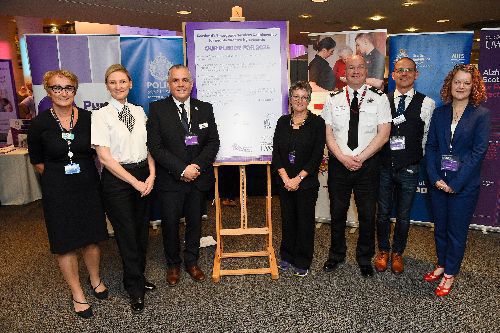Main content

Scotland’s emergency services joined forces for Dementia Awareness Week, to collectively sign a dementia pledge, to support people living with dementia and their families. The pledge was signed during Alzheimer Scotland’s Annual Conference held at the Edinburgh International Conference Centre (EICC) in Edinburgh.
The Alzheimer Scotland Centre for Policy and Practice, University of the West of Scotland, in partnership with the Scottish Fire and Rescue Service, Police Scotland, the Scottish Ambulance Service and Alzheimer Scotland, came together in 2017 to form the ‘Dementia and Emergency Services Collaborative’. This early commitment provided opportunities for emergency employees to learn more about dementia and understand how to respond to people living with dementia in emergency situations. To date 175 dementia information sessions have taken place with over 1,350 emergency services staff collectively becoming Dementia Friends.
Today’s emergency services 2025 dementia pledge continues to build on the commitment of the initial collaborative, by committing the fire, police and ambulance services to ensuring a dementia friendly-service is delivered to the community and for all those who come into contact with the emergency services, to help improve the safety and wellbeing of people living with dementia, their families and carers.
The 2025 dementia pledge commits the Dementia and Emergency Services Collaborative to:
- Ensure emergency services staff collectively have the knowledge, skills and understanding to recognise and support people living with dementia before, during and after and emergency incident.
- Work towards becoming dementia-friendly employers to help support colleagues who become carers or support those who themselves develop dementia.
- Increase inter-professional working across the emergency services and beyond, to maintain and improve the general safety and wellbeing of people living with dementia, their families and carers.
- Support organisations and individuals across Scotland to develop more dementia-friendly communities.
The pledge has been brought together through collaboration with people living with dementia in consultation with the Scottish Dementia Working Group (SDWG). Henry Rankin, a retired police officer, now living with vascular dementia, shared his experiences of working collaboratively to bring this pledge together to support a dementia-friendly emergency service.
Henry Rankin said: “It has been a privilege to support the work of the emergency services collaborative with University West of Scotland. As a member of the Scottish Dementia Working Group, we believe it is important to recognise that each person with dementia is an individual and that dementia is different for everyone. I am confident that the emergency services will take this message forward into their learnings to support people living with dementia, through the many difference emergency services they encounter.”
Claire Pearce, Director of Care Quality & Strategic Development at the Scottish Ambulance Service, said: “Signing this pledge is a significant step for the Emergency Services Collaborative. We recognise the significant impact of dementia on both individuals and society and are committed to improving the safety and wellbeing of those with the condition.
This milestone today reflects the need for a more cohesive approach to staff training within the three services and a joint strategy which ensures that those diagnosed with dementia and their carers receive the appropriate response when required.”
Professor Debbie Tolson, Director of the Alzheimer Scotland Centre for Policy and Practice, University of the West of Scotland, said: “The experience of dementia compounds the sense of vulnerability and bewilderment that accompany the unexpected. Understanding how to support and protect someone when they are at their most vulnerable requires understanding, dementia sensitive approaches, coupled with rapid decision making and effective actions. This pledge signals a commitment to equip first responders to be confident and capable in their work with people with dementia both in the moment of crisis and through preventative interventions.”
Henry Simmons, Chief Executive of Alzheimer Scotland, said: “With over 90,000 people with dementia in Scotland, almost every family now knows someone living with the illness, yet many people do not understand what the condition is, and what impact it has on those who live with it. All organisations and communities have an important part to play to help transform the lives of people with dementia, by helping to improve awareness of dementia, increase community support and help towards reducing isolation and stigma. I am enormously proud that our partners from Alzheimer Scotland Centre for Policy and Practice, University West of Scotland, together with the emergency services are standing together for Dementia Awareness Week, to sign this important dementia pledge. The pledge will go some way to help us create an understanding dementia-friendly society in Scotland, where people with dementia feel recognised, valued and supported.”
You can become a Dementia Friend by going online at www.dementiafriendsscotland.org. If you want to know how your business, workplace, school, college or organisation can get involved with Dementia Friends Scotland, email [email protected]

